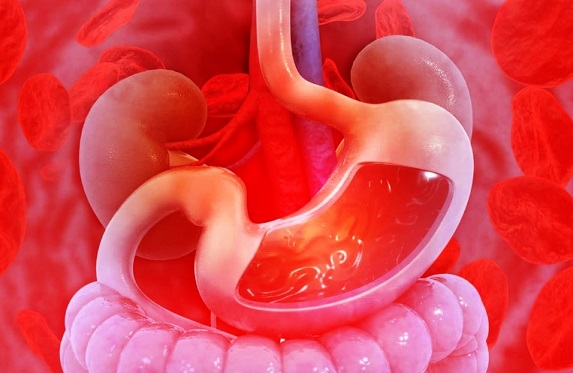COVID-19 Found to Dramatically Increase Risk of Upper GI Bleeding and Death in Hospitalized Patients
Nikhil Prasad Fact checked by:Thailand Medical News Team Apr 01, 2025 3 weeks, 15 hours, 11 minutes ago
Medical News: A new American study has revealed that COVID-19 can significantly increase the risk of dangerous gastrointestinal (GI) bleeding in hospitalized patients, potentially leading to much higher death rates. The research, conducted by a team from Cooper Medical School of Rowan University, Cooper University Health Care, Cooper Research Institute, and Virtua Gastroenterology in New Jersey, brings new attention to how the virus impacts the digestive system, not just the lungs.
 COVID-19 Found to Dramatically Increase Risk of Upper GI Bleeding and Death in Hospitalized Patients
COVID-19 Found to Dramatically Increase Risk of Upper GI Bleeding and Death in Hospitalized Patients
While COVID-19 is typically known for attacking the respiratory tract, doctors have increasingly reported GI symptoms such as diarrhea, nausea, and stomach pain in patients. However, the latest data shows that the virus can directly damage cells in the stomach and intestines, leading to serious upper GI bleeding. This
Medical News report takes a closer look at how this complication is emerging as a dangerous but often overlooked risk among hospitalized COVID-19 patients.
Duodenal Ulcers and Internal Bleeding More Common in COVID Patients
The researchers examined hospital records of adults who were admitted between January 2020 and December 2021 with signs of upper GI bleeding. They analyzed data from 39 SARS-CoV-2 positive patients and compared them to 78 non-COVID patients with similar bleeding issues. Notably, in patients who tested positive for the virus, duodenal ulcers (ulcers in the first part of the small intestine) were the most common source of bleeding, while in non-COVID patients, esophagitis (inflammation of the esophagus) was more frequently observed.
COVID-positive patients were much more likely to suffer from severe, progressive anemia and required significantly more blood transfusions, steroids, immunosuppressants, and proton pump inhibitors to stabilize their condition. Their symptoms were also more alarming - fever, shortness of breath, fatigue, and abdominal pain were more prevalent. These patients had higher rates of oxygen use, respiratory distress, and showed worse lab results such as low platelet counts and lower oxygen saturation.
Higher Death Rates and More Intensive Medical Intervention Needed
The death rate among COVID-positive patients with GI bleeding was over twice that of the non-COVID group - 12.8% versus 5.1%. In addition to requiring more aggressive treatment, they were also more likely to undergo major procedures such as endoscopy and had more therapeutic interventions to stop bleeding.
Alarmingly, about one-quarter of all patients - both COVID-positive and negative - only received their endoscopy more than 48 hours after signs of bleeding appeared, which could impact recovery and survival outcomes.
The medications these patients were on may have contributed to the bleeding as well. Many were taking blood thinners like aspirin, enoxaparin, heparin, and novel oral anticoagulants (NOACs), as well as immunosuppressive drugs and corticosteroids - all of which are known to increase
the risk of GI bleeding.
Study Calls for Greater Monitoring and Rapid Response for GI Bleeding in COVID Patients
The researchers strongly emphasize that COVID-19 patients require far more medical attention when GI bleeding is present. Delays in treatment, particularly in conducting endoscopy procedures to locate and stop bleeding, can be life-threatening. They suggest that endoscopy should be performed more urgently in these cases.
The study also references previous findings from around the world that report similar trends. Peptic ulcer disease and other GI complications are becoming increasingly common in patients with COVID-19, likely due to the virus’s ability to directly damage the gut lining and trigger severe inflammatory responses.
Why This Matters
This study sheds new light on how the COVID-19 virus can have serious and even fatal effects on the digestive system. It shows that even after four years of the pandemic, new complications are still being uncovered. The findings urge hospitals and healthcare workers to be more vigilant when treating COVID-19 patients, especially those showing signs of gastrointestinal distress.
Conclusion
The research highlights a clear association between SARS-CoV-2 infection and a higher risk of upper GI bleeding and death in hospitalized patients. The study found that COVID-positive patients had more severe bleeding, worse symptoms, and required significantly more medical intervention compared to their non-COVID counterparts. These findings stress the need for faster diagnosis and treatment, including urgent endoscopy, and careful medication management. With this new knowledge, doctors can better prepare and protect vulnerable patients, especially those already at risk due to other health conditions. Further studies are necessary to refine treatment strategies and reduce preventable deaths linked to GI complications in COVID-19 patients.
The study findings were published in the peer reviewed journal: Gastroenterology Research and Practice
https://onlinelibrary.wiley.com/doi/10.1155/grp/4358786
For the latest COVID-19 News, keep on logging to Thailand
Medical News.
Read Also:
https://www.thailandmedical.news/news/covid-19-s-surprising-link-to-acute-colon-ischemia
https://www.thailandmedical.news/news/doctors-warn-that-covid-19-can-cause-spontaneous-esophageal-rupture
https://www.thailandmedical.news/news/breaking-pediatricians-warn-that-covid-19-can-cause-gastric-perforations-in-new-borns
https://www.thailandmedical.news/articles/coronavirus
https://www.thailandmedical.news/pages/thailand_doctors_listings
